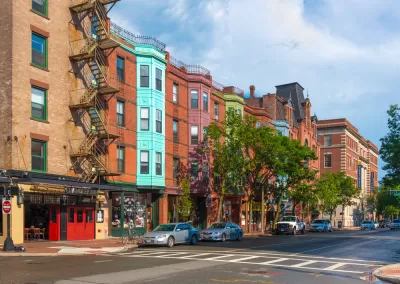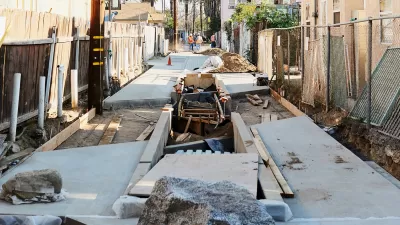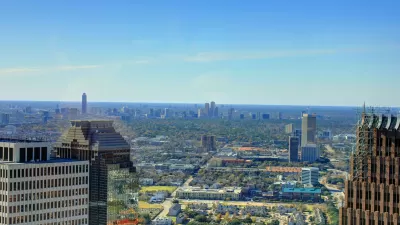The city will start by redesigning curb extensions to incorporate elements that improve flood prevention and stormwater management.

On the heels of appointing its first director of green infrastructure this summer, the city of Boston announced a green infrastructure policy aimed at incorporating sustainability and resilience into “certain small-scale, right-of-way city infrastructure projects,” specifically curb extensions.
Writing in Smart Cities Dive, Katie Pyzyk describes the plan, which has three parts: “five alternative curb bump-out designs that incorporate green infrastructure, two maintenance contracts for upkeep at new green infrastructure installations and a volunteer ‘adopt a space’ program for green infrastructure maintenance.”
Curb bump-outs typically are paved, but Boston’s alternative designs convert the small spaces into water management features. New curb extensions must incorporate at least one of the five named green infrastructure alternatives: bioretention, such as rain gardens; surface infiltration, such as tree pits; porous paving materials; subsurface infiltration, such as underground stone or sand; and one-time seeding for low-grow, evergreen grass or wildflowers.
Pyzyk describes green infrastructure as “a water management approach that mimics nature’s water cycles” and “incorporates plants and other materials to help stormwater absorb back into the ground and improve water quality through filtration.” According to Pyzyk, “green infrastructure reduces stress on existing ‘gray infrastructure’ — traditional stormwater management elements such as roads, drains, gutters, pipes and dams.”
FULL STORY: Boston wants to use curb bump-outs to manage flooding, boost resilience

Maui's Vacation Rental Debate Turns Ugly
Verbal attacks, misinformation campaigns and fistfights plague a high-stakes debate to convert thousands of vacation rentals into long-term housing.

Planetizen Federal Action Tracker
A weekly monitor of how Trump’s orders and actions are impacting planners and planning in America.

In Urban Planning, AI Prompting Could be the New Design Thinking
Creativity has long been key to great urban design. What if we see AI as our new creative partner?

How Trump's HUD Budget Proposal Would Harm Homelessness Response
Experts say the change to the HUD budget would make it more difficult to identify people who are homeless and connect them with services, and to prevent homelessness.

The Vast Potential of the Right-of-Way
One writer argues that the space between two building faces is the most important element of the built environment.

Florida Seniors Face Rising Homelessness Risk
High housing costs are pushing more seniors, many of them on a fixed income, into homelessness.
Urban Design for Planners 1: Software Tools
This six-course series explores essential urban design concepts using open source software and equips planners with the tools they need to participate fully in the urban design process.
Planning for Universal Design
Learn the tools for implementing Universal Design in planning regulations.
Gallatin County Department of Planning & Community Development
Heyer Gruel & Associates PA
JM Goldson LLC
City of Camden Redevelopment Agency
City of Astoria
Transportation Research & Education Center (TREC) at Portland State University
Jefferson Parish Government
Camden Redevelopment Agency
City of Claremont





























